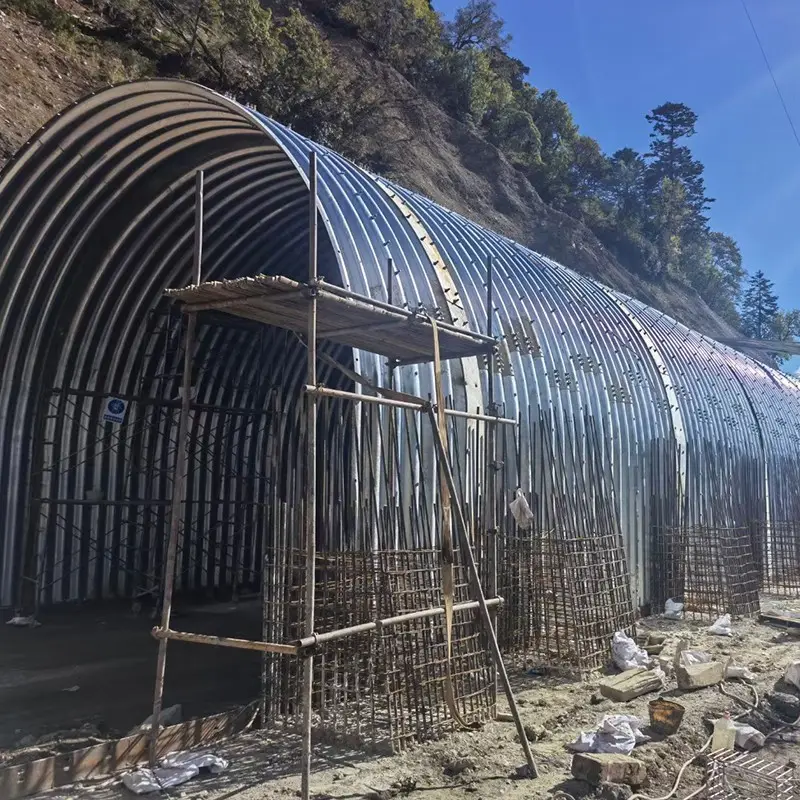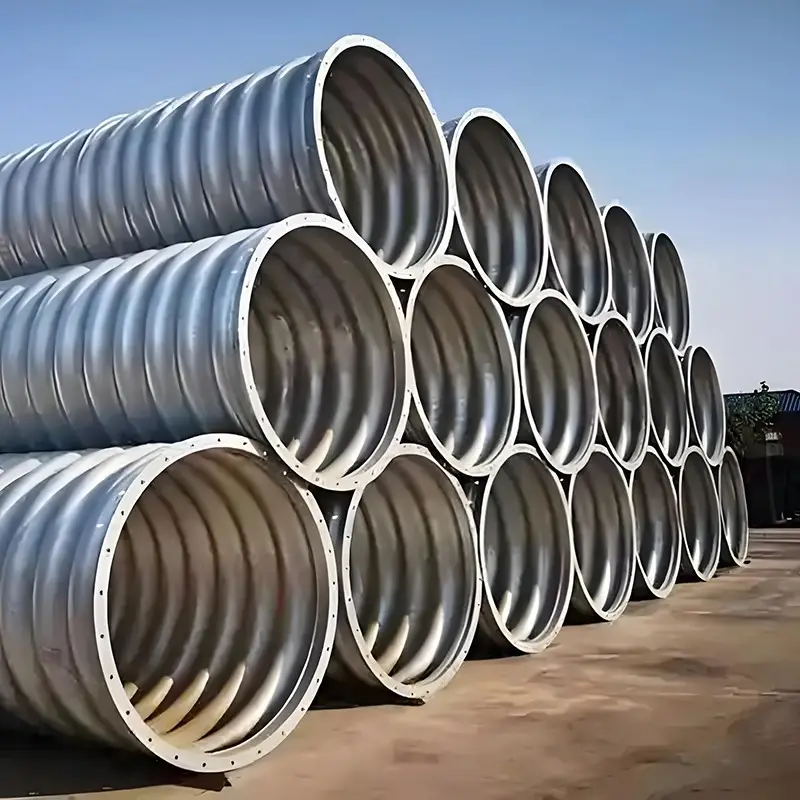اهمیت لوله فولادی موجدار در زیرساختهای مدرن
لوله فولادی موجدار به یکی از مواد اصلی در حوزه ساختوساز و توسعه زیرساختهای مدرن تبدیل شده است. از جادهها گرفته تا سیستمهای بزرگ زهکشی، این ماده به مهندسان، پیمانکاران و برنامهریزان پروژهها، تعادلی بین استحکام، انعطافپذیری و بهرهوری اقتصادی ارائه میدهد. طراحی منحصربهفرد موجدار لوله، ظرفیت تحمل بار آن را افزایش میدهد و آن را برای پروژههایی که بارهای سنگین خاک، جریان آب یا فشار ترافیکی همواره وجود دارد، مناسب میکند. برخلاف مواد سنتی که ممکن است نیاز به تعویض مکرر داشته باشند، لوله فولادی راه راه یک راهحل بلندمدت ارائه میدهد که با اهداف عملکردی و پایداری همراستا است.
امروزه، با گسترش شهرها، مناطق روستایی نیازمند زهکشی بهتر و صنایع بهدنبال راهحلهای مطمئن زیرساختی هستند، لوله فولادی راه راه ارزش خود را ادامه میدهد. ترکیبی از عملکرد سازهای و سازگاری با محیط زیست اجازه میدهد تا در انواع کاربردها مورد استفاده قرار گیرد. آنچه که در زیر بزرگراهها، در مزارع کشاورزی یا به عنوان بخشی از سیستمهای مدیریت آب سطحی نصب شده باشد، لوله فولادی موجدار بهطور مداوم قابلیت اطمینان و کارایی را فراهم میکند.
مزایای کلیدی لوله فولادی موجدار
استحکام و دوام
دوستداشتنی یکی از دلایل اصلی محبوبیت لوله فولادی موجدار در ساختوساز است. ساختار موجدار آن فشار را بهطور یکنواخت توزیع میکند و از تغییر شکل زودرس جلوگیری میکند. این طراحی همچنین به لوله اجازه میدهد تا در برابر چرخههای یخبندان-آبشدن، بارشهای شدید یا حتی سیلهای شدید مقاومت کند. در طول دههها، این دوام به معنای تعمیرات کمتر و بودجههای تعمیر و نگهداری پایینتر است که این مزیت برای شهرداریها و توسعهدهندگان خصوصی بسیار ارزشمند است.
مقاومت در برابر فشار
پروژههای زیرساختی اغلب موادی را میطلبد که بتوانند فشارهای بیرونی بسیار زیادی را تحمل کنند، بهویژه هنگامی که زیر لایههای خاک و آسفالت دفن شدهاند. لوله فولادی موجدار بهگونهای طراحی شده است که استحکام لازم برای چنین شرایطی را فراهم کند. توانایی حفظ یکپارچگی ساختاری حتی تحت بارهای سنگینترین شرایط، اطمینان میدهد که این لوله همچنان یکی از گزینههای مورد اعتماد در پروژههایی مانند بزرگراهها، فرودگاهها و پلها باقی بماند.
هزینه-کارایی
یک مزیت قوی دیگر لوله فولادی موجدار، مقرونبهصرفه بودن آن است. از آنجایی که وزن لوله در مقایسه با گزینههای دیگر مانند بتن مسلح سبکتر است، هزینههای حمل و نقل بهطور قابلتوجهی کاهش مییابند. همچنین نصب آن به راحتی باعث میشود پیمانکاران بتوانند پروژهها را سریعتر انجام دهند و هم زمان و هم هزینههای کارگری را صرفهجویی کنند. در بررسی هزینه کل چرخه عمر، لوله فولادی موجدار اغلب راهحل اقتصادیتری اثبات میکند.

کاربردهای لوله فولادی موجدار
مدیریت آب سطحی
هم مناطق شهری و هم روستایی به مدیریت مؤثر آبهای سطحی برای پیشگیری از سیل و حفاظت از زیرساختها متکی هستند. لوله فولادی موجدار یک انتخاب معتبر است، چرا که قادر است حجم زیادی از جریان آب را بدون فروپاشی سازهای تحمل کند. طراحی موجدار آن کارایی هیدرولیکی را افزایش میدهد و اجازه میدهد آب به سرعت و ایمنی از طریق آن عبور کند. در مناطقی که در معرض بارشهای شدید یا طوفانهای فصلی هستند، لوله فولادی موجدار اطمینان میدهد که آب اضافی به خوبی مدیریت شود و جادهها، ساختمانها و مناظر اطراف در برابر خسارات حفاظت شوند.
ساخت جاده و بزرگراه
لولههای فولادی موجدار مدتهاست که در ساخت قوسهای عبور آب در زیر جادهها و بزرگراهها امری ضروری محسوب میشوند. این قوسها اجازه میدهند تا جریان آب در زیر جاده جریان یابد و از خرابی سطح بالایی جاده جلوگیری شود. از آنجایی که این لولهها میتوانند وزن سنگین ترافیک مداوم خودروها را تحمل کنند، هم ایمنی و هم عملکرد مناسبی فراهم میکنند. مهندسان اغلب در این کاربردها از لولههای فولادی موجدار استفاده میکنند، چرا که این لولهها ترکیبی از استحکام و صرفهجویی در هزینه هستند و این اطمینان را فراهم میکنند که پروژهها در چارچوب بودجه انجام شوند و در عین حال دوام لازم را داشته باشند.
توسعه کشاورزی و روستایی
در پروژههای کشاورزی، کنترل آب نقش کلیدی در حفظ سلامت خاک و تضمین محصولات پرمحصول دارد. لوله فولادی موجدار معمولاً در سیستمهای زهکشی اراضی کشاورزی استفاده میشود و به دفع آب اضافی از مزارع و کاهش فرسایش کمک میکند. کشاورزان همچنین از دوام این لولهها بهره میبرند، زیرا پس از نصب، لوله میتواند به مدت دههها بدون نیاز به تعویض مکرر بهخوبی عمل کند. این قابلیت اطمینان به صرفهجویی بلندمدت در عملیات کشاورزی ترجمه میشود.
کاربردهای صنعتی
موارد صنعتی، بهویژه آنهایی که سیستمهای مدیریت آب در مقیاس بزرگ را میطلبند، نیز از لوله فولادی موجدار بهره میبرند. کارخانهها، معادن و پروژههای انرژی از آن برای زهکشی، سیستمهای فاضلاب و پشتیبانی از زیرساخت استفاده میکنند. انعطافپذیری لوله فولادی موجدار امکان استفاده از آن را در نیازهای صنعتی خاص فراهم میکند و استحکام و دوام آن را حتی در سختترین شرایط محیطی فراهم میکند.
مزایای زیستمحیطی و پایداری
قابلیت بازیافت
لوله فولادی موجدار تنها یک ماده مقاوم و قابل اطمینان نیست؛ بلکه بسیار پایدار نیز هست. این لوله از فولاد قابل بازیافت ساخته شده و به خوبی با تمرکز روزافزون بر شیوههای ساخت و ساز دوستدار محیط زیست هماهنگ میشود. در پایان عمر مفید خود، این ماده میتواند بازیافت شده و دوباره وارد چرخه تولید شود، تا از این طریق ضایعات کاهش یابد و اصول اقتصاد دایرهوار را پشتیبانی کند. این قابلیت بازیافت، لوله فولادی موجدار را به یک انتخاب مسئولانه از نظر محیط زیست تبدیل میکند.
مقاومت در برابر فشارهای زیستمحیطی
پروژههای ساختمانی اغلب با شرایط محیطی دشواری مواجه هستند که شامل خاکهای خورنده، دماهای بسیار بالا یا پایین و همچنین قرار گرفتن در معرض مواد شیمیایی میشود. لوله فولادی موجدار میتواند با پوششهای محافظتی مانند روکش گالوانیزه ساخته شود تا مقاومت آن در برابر این شرایط افزایش یابد. به عنوان مثال، در مناطق ساحلی، از لوله فولادی موجدار با روکش استفاده میشود تا در برابر خوردگی ناشی از آب شور مقاومت کند. این انعطافپذیری اطمینان حاصل میکند که لوله در انواع شرایط آبوهوایی و توپوگرافیهای مختلف به خوبی عملکرد داشته باشد.
مساهمت در زیرساختهای پایدار
پایداری امروزه اولویت روز در پروژههای زیرساختی در سراسر جهان محسوب میشود. لولههای فولادی موجدار با ارائه طول عمر بالا، نیاز کمتر به تعویض و روشهای تولید دوستدار محیط زیست، این تغییر را تسهیل میکنند. با انتخاب لولههای فولادی موجدار، مدیران پروژه میتوانند اهداف ساخت و ساز خود را با مسئولیتپذیری محیط زیستی همراستا کنند و به توسعه پایدار شهری کمک کنند.
مزایای نصب و نگهداری
سهولت نصب
طبیعت سبک وزن لولههای فولادی موجدار امکان نصب سریعتر و آسانتر آنها را نسبت به سایر مواد لولهکشی فراهم میکند. این ویژگی نه تنها زمان اجرای پروژه را کاهش میدهد، بلکه نیاز به تجهیزات تخصصی را نیز پایین میآورد. فرآیند مونتاژ ساده شده موجب میشود که تیمهای نصب بتوانند وظایف خود را بهصورت کارآمد انجام دهند و پروژهها به موقع به اتمام برسند.
الزامات نگهداری کم
پس از نصب، لوله فولادی موجدار به نگهداری بسیار کمی نیاز دارد. استحکام و دوام آن احتمال بروز مشکلات سازهای را کاهش میدهد، در حالی که بازرسیهای منظم معمولاً کافی است تا عملکرد آن حفظ شود. این مزیت کمنگهداری بهویژه برای شهرداریها و سازمانهای بزرگی که نظارت بر چندین سیستم زیرساختی را برعهده دارند و به دنبال راهکارهای مؤثر و بلندمدت هستند، بسیار جذاب است.
روندهای نوظهور و توسعه آینده
یکپارچهسازی با زیرساختهای هوشمند
با پیشرفت فناوریهای شهر هوشمند، لوله فولادی موجدار در حال یکپارچهسازی با سیستمهای زیرساختی هوشمند است. به عنوان مثال، حسگرها میتوانند درون لولههای آب باران نصب شوند تا جریان آب را نظارت کنند، مسدودشدگیها را تشخیص دهند و دادههای لحظهای را به برنامهریزان شهری ارائه دهند. ترکیب این ماده دوامپذیر با فناوری مدرن، سیستمهای مدیریت آب بسیار کارآمد و پاسخگو را ایجاد میکند.
گسترش در پروژههای زیرساختی جهانی
با سرعت بالای شهرنشینی در سراسر جهان، انتظار میرود که لوله فولادی موجدار در توسعه زیرساختهای جهانی تقاضای بیشتری داشته باشد. از بزرگراههای عظیم تا سیستمهای کنترل سیل بزرگمقیاس، انعطافپذیری آن را به گونهای میکند که در بزرگترین و پیچیدهترین پروژهها کاربرد داشته باشد. به ویژه کشورهای در حال ظهور در حالی که شبکههای حمل و نقل و زیرساختهای شهری خود را گسترش میدهند، از لوله فولادی موجدار استفاده میکنند.
نوآوریهای پایداری در آینده
تولیدکنندگان به بررسی راههای بهبود پایداری لوله فولادی موجدار ادامه میدهند. پیشرفتهایی در پوششها، روشهای تولید و فناوریهای بازیافت انتظار میرود عمر لوله را حتی بیشتر کند و همزمان اثرات زیستمحیطی آن را کاهش دهد. با سختگیرانهتر شدن استانداردهای ساختمان سبز، لوله فولادی موجدار به گونهای تکامل خواهد یافت که گزینهای جذابتر برای ساختوساز پایدار شود.
سوالات متداول
عمر لوله فولادی موجدار چقدر است
لوله فولادی موجدار میتواند 50 سال یا بیشتر دوام بیاورد، بسته به شرایط نصب و محیطی. با پوششهای محافظ مناسب و بازرسیهای منظم، عمر مفید آن میتواند حتی بیشتر نیز شود.
لوله فولادی موجدار چگونه با گزینههای بتنی مقایسه میشود؟
اگرچه لولههای بتنی محکم هستند، لوله فولادی موجدار وزن کمتر، دستانداز آسانتر، نصب سریعتر و صرفهجویی در هزینه را فراهم میکند. همچنین این لوله به شرایط خاک و بارگذاری خاص بهتر تطبیق مییابد و در نتیجه در بسیاری از کاربردها انعطافپذیری بیشتری دارد.
آیا لوله فولادی موجدار را میتوان در مناطق با خاک خورنده استفاده کرد؟
بله، هنگامی که با اندود روی یا سایر پوششهای محافظ تولید شود، لوله فولادی موجدار در محیطهای خورنده عملکرد خوبی دارد، از جمله مناطق ساحلی یا مناطق با شیمی خاک تهاجمی.
چرا لوله فولادی موجدار از نظر محیطزیستی سازگار تلقی میشود؟
لوله فولادی موجدار به دلیل اینکه از مواد قابل بازیافت تولید میشود، نیازمند انرژی کمتری برای حمل و نصب است و با ایجاد زیرساختهای پایدار در طولانیمدت، اثرات محیطی بسیار محدودی دارد، به عنوان یک محصول دوستدار محیط زیست شناخته میشود.

